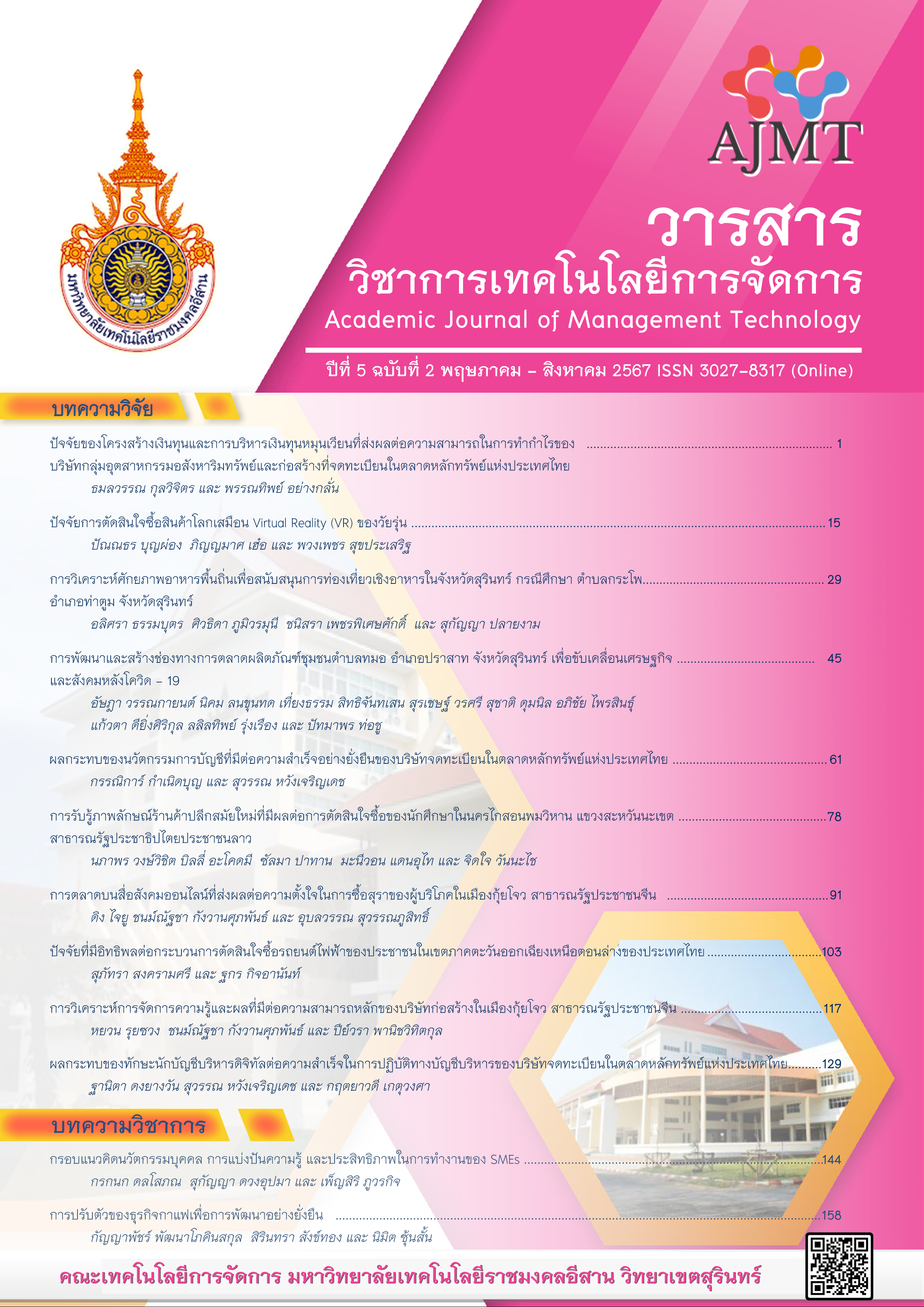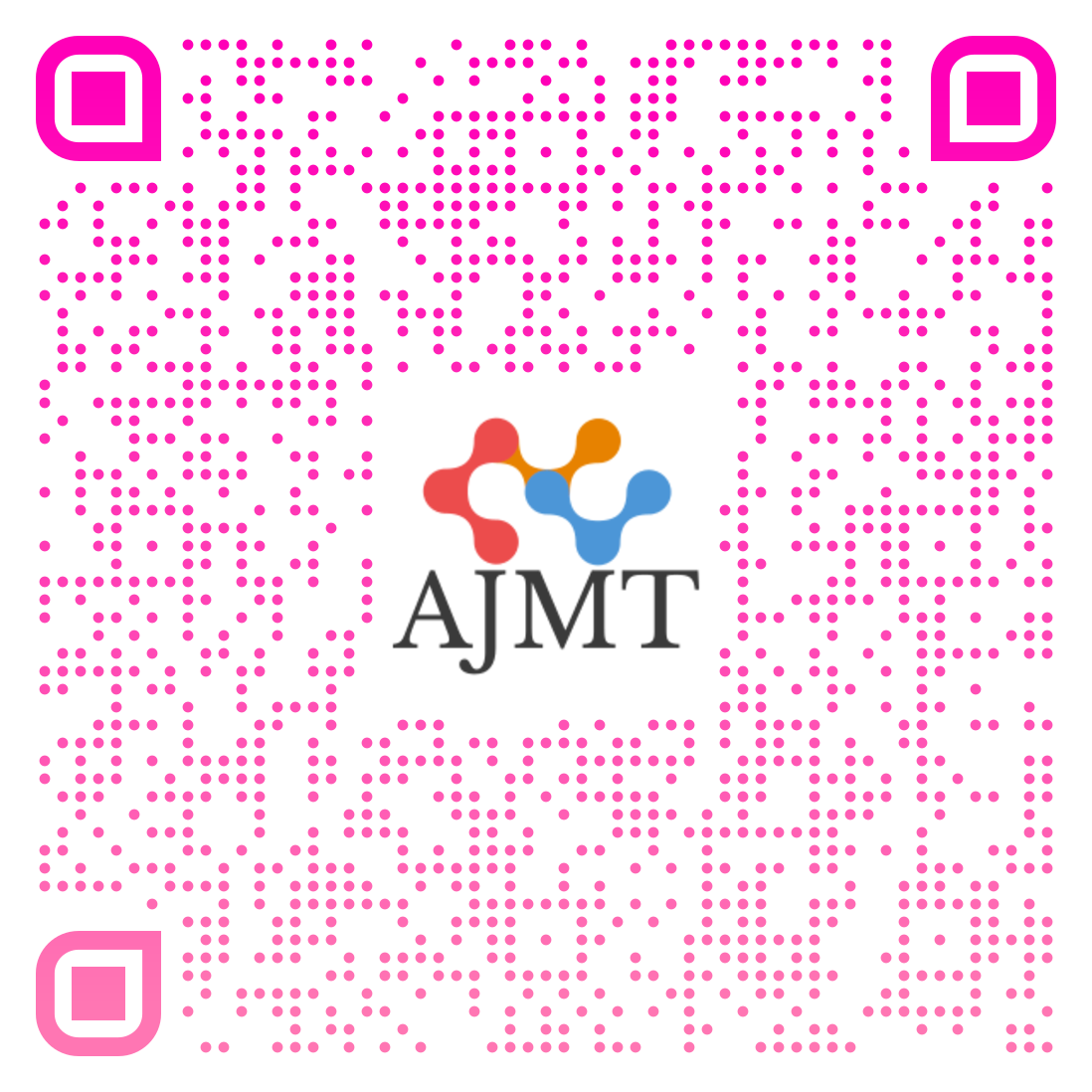ผลกระทบของนวัตกรรมการบัญชีที่มีต่อความสำเร็จอย่างยั่งยืนของบริษัทจดทะเบียนในตลาดหลักทรัพย์แห่งประเทศไทย
DOI:
https://doi.org/10.14456/ajmt.2024.14คำสำคัญ:
ความสำเร็จอย่างยั่งยืน, นวัตกรรมการบัญชี, บริษัทจดทะเบียนในตลาดหลักทรัพย์แห่งประเทศไทยบทคัดย่อ
การวิจัยครั้งนี้มีวัตถุประสงค์ เพื่อศึกษาทดสอบผลกระทบและเปรียบเทียบนวัตกรรมการบัญชีที่มีต่อความสำเร็จอย่างยั่งยืนของบริษัทจดทะเบียนใตลาดหลักทรัพย์แห่งประเทศไทย จำแนกตามคุณลักษณะของธุรกิจ โดยใช้แบบสอบถามเป็นเครื่องมือในการเก็บรวบรวมข้อมูลจากผู้บริหารฝ่ายบัญชีของบริษัทจดทะเบียนในตลาดหลักทรัพย์ แห่งประเทศไทย จำนวน 172 คน สถิติที่ใช้ในการวิเคราะห์ข้อมูล ได้แก่ การวิเคราะห์สหสัมพันธ์แบบพหุคูณ และการวิเคราะห์การถดถอยแบบพหุคูณ ซึ่งนวัตกรรมการบัญชีได้ถูกกำหนดเป็นตัวแปรอิสระที่มีความสัมพันธ์และผลกระทบกับความสำเร็จอย่างยั่งยืนของบริษัทจดทะเบียนใตลาดหลักทรัพย์แห่งประเทศไทย ผลการวิจัย พบว่า นวัตกรรมการบัญชี ด้านการขับเคลื่อนเชิงพลวัตของระบบสารสนเทศทางบัญชี ด้านประสิทธิผลข้อมูลทางการเงิน และด้านการบริหาร ความเสี่ยงและควบคุมภายใน มีความสัมพันธ์และผลกระทบเชิงบวกกับความสำเร็จอย่างยั่งยืนของบริษัทจดทะเบียนในตลาดหลักทรัพย์แห่งประเทศไทย ขณะเดียวกันตัวแปรที่มีผลกระทบเชิงลบอย่างมีนัยสำคัญ ได้แก่ นวัตกรรมการบัญชี ด้านการบูรณาการเทคโนโลยี ดังนั้นผู้บริหารฝ่ายบัญชีของบริษัทจดทะเบียนในตลาดหลักทรัพย์แห่งประเทศไทยควรให้ความสำคัญนวัตกรรมการบัญชี โดยใช้เป็นข้อมูลในการพัฒนาและปรับปรุงนวัตกรรมการบัญชีและใช้เป็นข้อสนเทศ ในการประยุกต์ใช้นวัตกรรมใหม่ให้เกิดความได้เปรียบเชิงการแข่งขันได้ เพื่อช่วยให้การดำเนินงานของบริษัทจดทะเบียน ในตลาดหลักทรัพย์แห่งประเทศไทย มีประสิทธิภาพและบรรลุวัตถุประสงค์ขององค์กรจนเกิดความสำเร็จอย่างยั่งยืนได้
เอกสารอ้างอิง
Aaker, D. A., Kumar, V., Day, G. S., & Leone, R. P. (2011). Marketing research, 10. Aufl. John Wiley & Sons Ltd.
Barney, J. (1991). Firm resources and sustained competitive advantage. Journal of Management, 17(1), 99-120.
Srisaard, B. (2011). Basic research (7th ed.). Children’s club.
Baotham, S. (2015). Accounting research. Triple Education.
Bock, L. (2015). Work rules!: Insights from inside Google that will transform how you live and lead. Hodder & Stoughton.
Chiaranai, C., Chularee, S., & Srithongluang, S. (2018). Older people living with chronic illness. Geriatric Nursing, 39(5), 513-520.
Choengram, O., Taewchoho, T., Hemmarat, C., Chiangnar, S. Poowadin, P. & Waiyawout, K. (2023). Navigating Risk management in modern organizations: The impact of transformative digital technology. Academic Journal of Management Technology, 4(2), 239-250.
Department of Business Development. (2019). Keeping up with the new dimension of accounting in the digital age, Department of Business Development Accelerating the strengthening of accounting office business operators...accepting change (Issue 51). https://www.dbd.go.th/news_view.php?nid=469414025
Dorf R. C., & Byers T. H. (2008), New Technology Ventures (2th ed.). McGraw-Hill.
Eisenhardt, K. M., & Martin, J. A. (2000). Dynamic capabilities: what are they?. Strategic Management Journal, 21(10‐11), 1105-1121.
Hair, J.F., Black, W.C.& Erson, R.E. (2006). Multivariate Data Analysis (6th ed.). Pearson.
Jantasopa, J. (2016). The impact of morality in the accounting profession on the work success of hospital accountants under the Ministry of Public Health in the northeastern region [Unpublished Master’s thesis]. Maha Sarakham University.
International Business Machines. (2023). Artificial intelligence (AI) solutions. https://www.ibm.com/artificial-intelligence?lnk=flathl
Katasila, K. (2021). The competence of accountants can affect the successful performance of the accounting information system operation of the SME entrepreneurs in the service sector of the Bangkok area [Unpublished Doctoral dissertation]. Sripatum University.
Lertpiromsuk, S., Sudhikiat, S., Aramrattana, O., & Kijrungrojjarean, P. (2024). The influence of accounting learning organization on the quality of financial report through the application of accounting innovation of bookkeepers in Bangkok. Journal of Humanities and Social Sciences Thonburi University, 18(1), 190-202.
Lertsahaphan. W., & Laonamtha. U. (2020). Effect of electronic accounting information systems on accounting best practice of electrical and electronics businesses in Thailand [Unpublished Master’s thesis]. Maha Sarakham University.
Mahoran, J., Petchchedchoo, P., Kumsuprom, S., & Vilalai, P. (2022). Factors affecting the success of information technology adoption in accounting professions. Suthiparithat Journal, 36(1), 80-100.
Marcus, M. L. (2015). Accessing vs sourcing knowledge: A comparative study of R&D internationalization between emerging and advanced economy firms. Journal of International Business Studies, 46(1), 63-86.
McKinsey. (2024). A survey of modern AI. https://www.normthing.com/2024/03/12/ai-gen-survey
Meekrut, P. (2024). Knowledge Management of organization in the digital age. Journal of Interdisciplinary Social Development, 2(2), 45-68.
Mitrapanont, K., & Laohavichien, T. (2019). Effect of corporate governance quality and the internal audit function quality on enterprise risk management effectiveness. Journal of Federation of Accounting Professions, 15(46), 5-26.
Phinit, S & Sukwatanasinit, K. (2018). The effectiveness of managerial accounting information affecting competitiveness and profitability of business. Journal of Multidisciplinary in Social Sciences, 14(3), 21-43.
Pungboonpanich, P., & Nakyam, N. (2022). The effect of digital accounting on the quality of financial reports. Suranaree Journal of Social Science, 16(1), 26-43.
Prajakjit, P. (2022). Causal factors of accounting information systems influencing the quality of financial reports of small and medium enterprises in Bangkok [Unpublished Doctoral dissertation]. Sripatum University.
Quinn, R. E., & Rohrbaugh, J. (1983). A spatial model of effectiveness criteria: Towards a competing values approach to organizational analysis. Management Science, 29(3), 363-377.
Rahab. (2012). Innovativeness model of small and medium enterprises based on market orientation and learning orientation: Testing moderating effect of business operation mode. Procedia Economics and Finance, 4, (2012), 97-109
Rummasint, N., Srisuwannapa, C., & Rojniruttikul, N. (2014). Learning organization factors affecting innovation management in Thai Summit Automotive Co., Ltd., (Eds.) In proceedings of annual (pp. 15-16). Tokyo Business Research Conference.
Rapeepisan, W. (2011). Human resource management (3rd ed.). Bangkok. Fine Handicrafts.
Ratanasongtham, W. (2021). Casual factors of modern accountant’s professional quotients influencing accounting practice efficiency and sustainable accounting success of accountants in companies listed on the stock exchange of Thailand. Modern Management Journal, 19(2), 64-81.
Saenubon, N. (2019). Influences of accounting innovation and competitive advantage on investors’ decision of listed companies in Thailand. Journal of Management Science, Ubon Ratchathani University, 8(16), 52-70.
Samakketkarnpol, S., & Petchchedchoo, P. (2018). The relationship between corporate governance mechanisms and management fraud of the companies listed in the stock exchange of Thailand. Suthiparithat, 32(101), 92-109.
Sawang, P., Charoenwiriyakul, C., & Somjai, S. (2022). Administrative effectiveness of administrators of Don Tum subdistrict administration organization, Nakhon Pathom province. The Journal of Development Administration Research, 12(1), 44-56.
Seangarvut, P., Prakobsaeng, P., & Kumsuprom, S. (2020). Corporate governance, firm performance and market value: Listed firms in thailand (mai). Suthiparithat, 34(109), 1-16.
Scott, J. H. (1977). Bankruptcy, secured debt, and optimal capital structure. The Journal of Finance, 32(1), 1-19.
Souza, L. A. & Da Silva MJPBM, F. T. (2017). The acceptance of information technology by the accounting area. Sistemas and Gestao, 12(4), 516-524.
Techatanaset, P. (2021). Model of the relationship between the competence of the chief executive officer, the quality of internal control and the quality of financial reports that affects the financial effectiveness of companies listed on the stock exchange of Thailand [Unpublished Doctoral dissertation]. Sripatum University.
Teerathanachaiyakun, K. & Teerachaipat, C. (2024). Factors influencing innovation small and medium-sized enterprises (SMEs) in the service sector, hotel accommodation type, in Thailand. Academic Journal of Management Technology, 5(1), 59-70.
Thuan, P. Q. et al. (2022). The determinants of the usage of accounting information systems toward operational efficiency in industrial revolution 4.0: Evidence from an emerging economy. Economies, 10(4), 83-101.
The Securities and Exchange Commission. (2023). Acts and Royal Decrees. https://www.sec.or.th/TH/Pages/LawandRegulations/ActandRoyalEnactment.aspx
The Comptroller General’s Department. (2023). 130 years of determination The Comptroller General’s Department launches “CGD Application” to elevate the organization to digital. Develop work with innovation Create sustainable economic and social stability. https://www.cgd.go.th/cs/internet/internet
Varzaru, A. A. (2022). Assessing artificial intelligence technology acceptance in managerial accounting. Electronics, 11(14), 2256.
Worakham, P. (2017). Educational Research (9th ed.). Maha Sarakham. Taksila.
Yuchtman, E., & Seashore, S. E. (1967). A system resource approach to organizational effectiveness. American Sociological Review, 32(6), 891-903.
ดาวน์โหลด
เผยแพร่แล้ว
รูปแบบการอ้างอิง
ฉบับ
ประเภทบทความ
สัญญาอนุญาต
ลิขสิทธิ์ (c) 2024 คณะเทคโนโลยีการจัดการ มหาวิทยาลัยเทคโนโลยีราชมงคลอีสาน วิทยาเขตสุรินทร์

อนุญาตภายใต้เงื่อนไข Creative Commons Attribution-NonCommercial-NoDerivatives 4.0 International License.
บทความที่ได้รับการตีพิมพ์เป็นลิขสิทธิ์ของคณะเทคโนโลยีการจัดการ มหาวิทยาลัยเทคโนโลยีราชมงคลอีสาน วิทยาเขตสุรินทร์
ข้อความที่ปรากฏในบทความแต่ละเรื่องในวารสารวิชาการเล่มนี้ เป็นความคิดเห็นส่วนตัวของผู้เขียนแต่ละท่านไม่เกี่ยวข้องกับคณะเทคโนโลยีการจัดการ มหาวิทยาลัยเทคโนโลยีราชมงคลอีสาน วิทยาเขตสุรินทร์ และคณาจารย์ท่านอื่นๆในมหาวิทยาลัยฯ แต่อย่างใด ความรับผิดชอบองค์ประกอบทั้งหมดของบทความแต่ละเรื่องเป็นของผู้เขียนแต่ละท่าน หากมีความผิดพลาดใดๆ ผู้เขียนแต่ละท่านจะรับผิดชอบบทความของตนเองแต่ผู้เดียว










